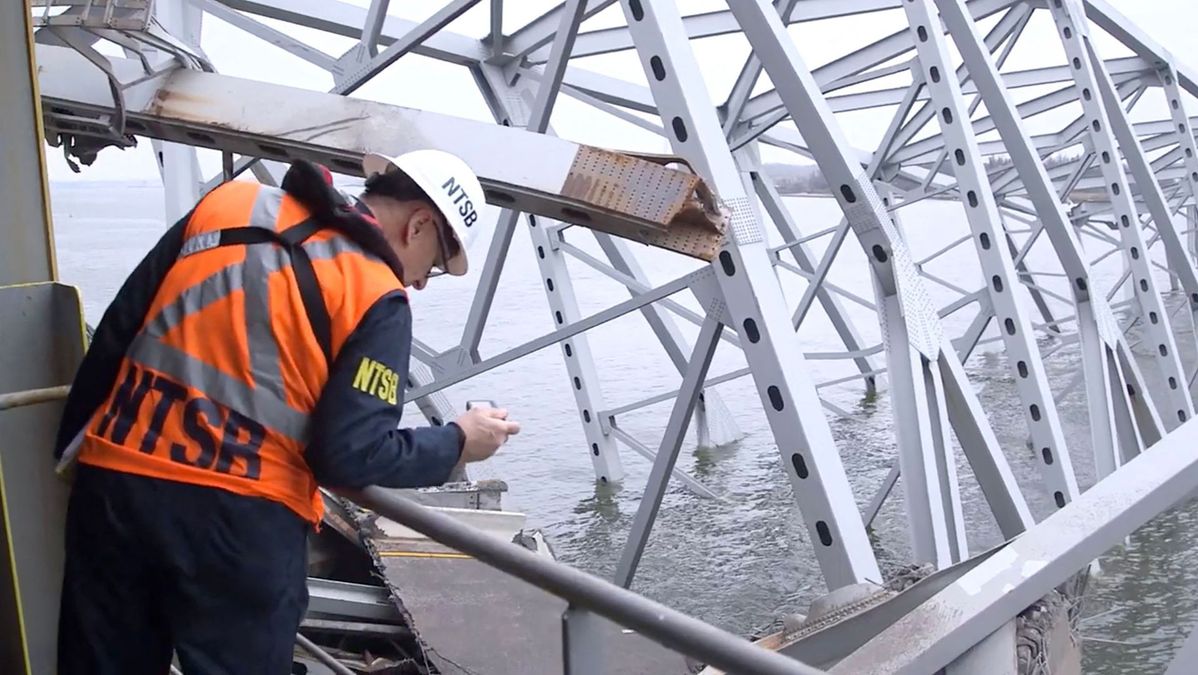Cranes head to Baltimore to clear bridge wreckage
By AI HEPING in New York | chinadaily.com.cn | Updated: 2024-03-29 09:30

As massive barges carrying cranes headed to Baltimore to begin removing twisted metal from the collapsed Francis Scott Key Bridge, officials said the blocking of the nation's ninth-busiest port will not only hurt the local economy but could snarl supply chains.
Divers reached the bodies of two men in a pickup truck near the bridge's middle span on Wednesday, but officials said they would need to start clearing the wreckage before anyone could reach the bodies of four other missing workers.
It could be weeks or months before ships resume serving the port. The 948-foot containership that took the bridge down early Tuesday morning, the Dali, is still in the port. Ten vessels are stuck there, according to the Bureau of Transportation Statistics (BTS), including three bulk carriers.
Baltimore's port has become increasingly important to US retailers and manufacturers seeking to diversify their supply networks and bring goods closer to customers, Jonathan Gold, vice-president of supply chain and customs policy at the National Retail Federation, told The Associated Press.
"Everybody is trying to figure out the impact on the supply chain" from the loss of the bridge, said Gold. He added that it is too early to tell how long shipments might be delayed.
The port's suspension is "one more disruption in an already-stressed system" for the global supply chain, said Abe Eshkenazi, CEO of the Association for Supply Chain Management. Cargo will now have to be rerouted to other ports, he said, which means figuring out where there is enough capacity to move things.
Market analysts are also looking at the impact the accident could have on auto imports. Baltimore's port handles the highest volume of shipments of cars and light trucks.
Ports around the country are preparing to absorb a surge in volume as companies reroute around the port and avoid the East Coast more generally.
While many of the 30,000 to 35,000 cars and trucks that used the bridge daily can be rerouted through the two nearby tunnels, that will cause traffic delays. Hazardous materials that aren't allowed in the tunnels will be diverted on a longer detour.
Rerouting cargo could push up trucking and rail prices if the volumes are significant and could cause some congestion at those alternative ports, Judah Levine, head of research at logistics firm Freightos, told CNN.
The port also is an important artery for the movement of construction machinery and coal. It is also the largest US port by volume for handling farm and construction machinery, as well as agricultural products.
It handled 52.3 million tons of foreign cargo worth nearly $81 billion in 2023, according to Maryland data, and creates more than 15,000 jobs.
The port ranked second in the country for exporting coal last year, according to the state of Maryland. But it isn't a huge global supplier of thermal coal, and the disruption can likely be made up by replacements from Australia or Indonesia if needed, said Alexis Ellender, lead analyst at global trade intelligence company Kpler.
Most of the coal from Baltimore makes its way to India for electricity generation, Ernie Thrasher, the CEO of the coal trading firm Xcoal Energy & Resources, told Bloomberg.
"The big question is the impact on India more than any global impact," Thrasher said.
Some of that coal will be rerouted, but complicated logistics will limit how much other ports can take.
Mary Kane, president and CEO of the Maryland Chamber of Commerce, said the economic impact on Baltimore and the state of Maryland is "incomprehensible".
With port operations at a standstill, there is concern that many longshore workers could be unemployed. The immediate price tag: $2 million in wages a day and 8,000 jobs, according to US Transportation Secretary Pete Buttigieg.
"That's one of the areas we're mostly concerned about," he said at a White House briefing Wednesday.
The port handled foreign cargo worth $80 billion in 2023, according to Maryland Governor Wes Moore, meaning there will be millions of dollars in lost trade and taxes for every day that shipping vessels are blocked from accessing it.
Sean McNally, spokesperson for the American Trucking Association (ATA), told Fox Business, that trucks moving hazardous materials will now be subject to roughly 30 miles of detours around Baltimore because they are prohibited from using the city's tunnels.
"This will add significant cost in time, fuel and delays for trucks traveling through the region," he said.
























